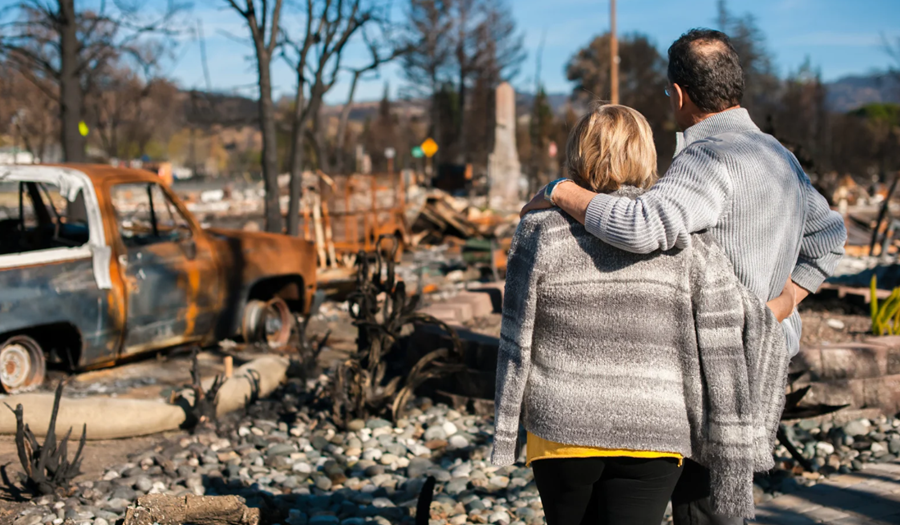
Protecting Yourself from Post-Disaster Scams
10/1/2025
Natural disasters like fires, hurricanes, and floods can be devastating, not only due to the physical damage they cause, but also because of the emotional and financial toll they take. After a disaster, it’s common for survivors to feel vulnerable, making them prime targets for scammers looking to take advantage of their situation.
Scams in the aftermath of a disaster are unfortunately widespread, with criminals exploiting people’s desperation and confusion. These fraudsters use a variety of tactics to steal money or personal information. It's crucial to be aware of these scams and take proactive steps to protect your finances during this already challenging time.
5 Common Post-Disaster Scams
Phony Charities and Donation Scams
In the wake of a disaster, many well-meaning individuals seek to help those affected. Unfortunately, scam artists often pose as charity organizations, asking for donations to aid disaster victims. They may create fake websites, social media pages, or even call victims offering fake donation opportunities.
How to Protect Yourself:
Verify the charity before donating. Look for websites that are well-established and reputable.
Use resources like Charity Navigator or GuideStar to confirm the legitimacy of the organization.
Avoid giving personal or financial information over the phone to unsolicited callers claiming to represent charities.
Contractor and Repair Scams
After a hurricane or fire, many people need to repair their homes. Scammers posing as contractors often target disaster survivors by offering quick, low-cost repairs that end up being subpar or incomplete. Some may ask for full payment upfront and then disappear after taking the money.
How to Protect Yourself:
Get multiple quotes from reputable contractors before agreeing to any work.
Never pay for repairs in full upfront. A legitimate contractor will accept a reasonable deposit and payment upon completion of the work.
Research the contractor’s credentials and check their references. Look for online reviews and ask for proof of insurance and licensing.
Avoid door-to-door solicitations and offers from contractors who “just happened to be in the area.”
Fake Government Aid Offers
Scammers often impersonate government agencies like FEMA or the Small Business Administration (SBA) to offer fake disaster assistance. They might ask for personal information or money to process supposed aid applications. These types of scams are particularly dangerous because the fraudsters may use legitimate-sounding names and logos to seem official.
How to Protect Yourself:
Be cautious of unsolicited phone calls, emails, or text messages claiming to offer aid. Real government agencies typically won’t contact you directly.
Always visit official government websites (such as FEMA.gov) to apply for assistance or get updates on disaster relief.
Don’t give out personal or financial information over the phone, especially to unsolicited callers.
Rental Scams
After a disaster, many people are displaced and need temporary housing. Fraudulent landlords may advertise rental properties that do not exist or ask for deposits on homes that are already occupied or damaged. They may also demand a full upfront rental fee and disappear with the money.
How to Protect Yourself:
Never send money without verifying the property in person, especially for a rental you found online.
Use trusted rental platforms that offer secure payment methods.
Beware of prices that seem too good to be true or landlords who pressure you to sign a lease or send money quickly.
Debt Relief and Financial Scams
In the aftermath of a disaster, many survivors find themselves overwhelmed by the financial burden of rebuilding. Scammers may offer fake debt relief services, promising to negotiate or consolidate your debts, but in reality, they are only after your money.
How to Protect Yourself:
Be wary of any debt relief company that asks for a large upfront fee or guarantees they can erase your debt.
Verify the company’s reputation and credentials by checking with organizations like the National Foundation for Credit Counseling (NFCC).
Remember that nonprofit credit counseling services, like those offered by Navicore Solutions, are legitimate and often available for free for genuine disaster victims.
How to Avoid Scams After a Disaster
1. Stick to Trusted Sources
Only trust information and offers from reliable sources, such as well-known charity organizations, government agencies, and established companies. Scammers often prey on confusion, so always double-check the source of any communication.
2. Protect Your Personal Information
Be mindful of how and where you share your personal information. Scammers may use email, phone calls, or social media to trick you into revealing sensitive details like your Social Security number, bank account information, or credit card details.
3. Don’t Rush Decisions
It’s natural to feel a sense of urgency after a disaster, but scammers exploit this rush. Take your time to research offers, contractors, or services, and avoid making quick decisions without proper verification.
4. Report Suspicious Activity
If you believe you have encountered a scam, report it to the Federal Trade Commission (FTC) at ReportFraud.ftc.gov or your state’s attorney general’s office. This helps protect others from falling victim to similar scams.
5. Seek Help from a Reputable Credit Counseling Service
If you are struggling to manage your finances after a disaster, reach out to a reputable nonprofit credit counseling service, like Navicore Solutions. They can help you with budgeting, debt management, and accessing government assistance programs.
The aftermath of a natural disaster is a time of intense stress and uncertainty. It’s important to stay vigilant and protect yourself from scammers who are looking to take advantage of vulnerable individuals. By educating yourself about common scams, verifying the legitimacy of offers, and taking steps to safeguard your financial information, you can better navigate the recovery process without falling prey to fraud.
Lori Stratford is the Digital Marketing Manager at Navicore Solutions. She promotes the reach of Navicore's financial education to the public through social media and blog content.
You can follow Navicore Solutions on Facebook, X, LinkedIn and Pinterest. We'd love to connect with you.
